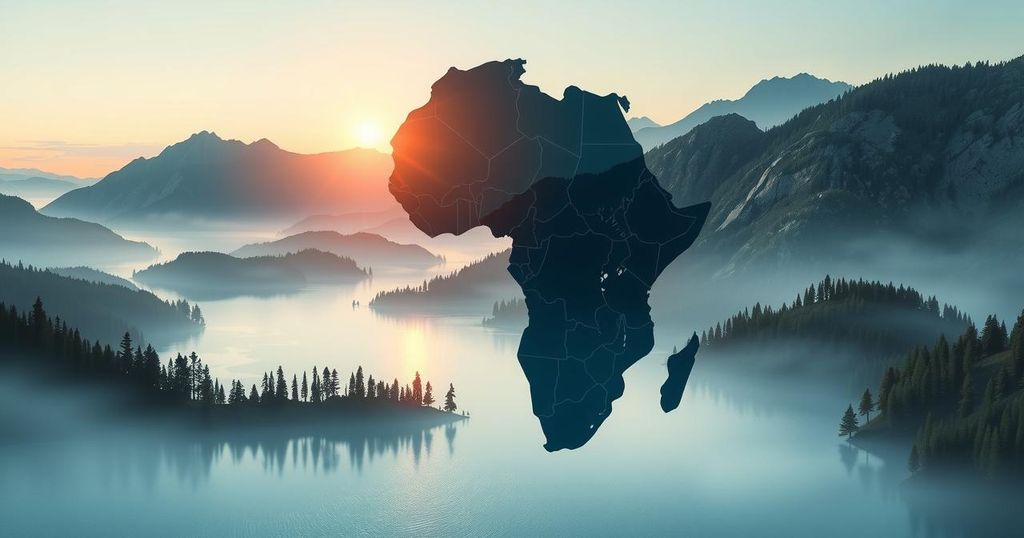The DRC is experiencing a crisis due to M23 rebel activity, prompting regional powers like Rwanda, Burundi, and Uganda to engage in the conflict. President Tshisekedi seeks to regain lost territory while accusing Rwanda of aggression. Rwanda defends its actions citing security concerns; Burundi fears for its regime stability. Uganda plays a complex role, supporting the DRC while allegedly backing M23. South Africa is involved militarily but has confronted Rwanda diplomatically, highlighting divisions between regional blocs.
The Democratic Republic of Congo (DRC) is facing a humanitarian and diplomatic crisis due to the M23 rebels seizing significant territories in its mineral-rich eastern regions. This situation has seen the involvement of multiple African nations, exacerbating a long-standing history of external interference in DRC affairs. The DRC, being a vast country, is engaging both East and Southern African regional blocs in an emergency meeting to address the ongoing conflict.
President Félix Tshisekedi of the DRC is prioritizing the recovery of territories lost to M23, particularly the major city of Goma. He has accused Rwandan President Paul Kagame of providing military support to M23, facilitating an invasion to exploit the DRC’s mineral resources. Despite a UN report supporting Tshisekedi’s claims, international responses to Rwanda’s actions have been largely rhetorical, leaving the Congolese leader concerned about his political survival amid the growing conflict.
Rwanda’s President Paul Kagame, while denying military assistance to M23, asserts that Rwanda’s primary concern is to eradicate threats posed by Hutu extremists who fled there post-genocide. He accuses the DRC’s military of collaborating with these armed groups against Tutsi civilians and insists on the need for DRC to negotiate directly with M23, a demand rejected by Tshisekedi. Kagame’s underlying objective appears to be maintaining influence over eastern DRC as well as accessing its mineral wealth.
Burundi’s military presence in eastern DRC has been significant in countering Burundian rebels and aiding the DRC government against M23. However, Burundi’s President Evariste Ndayishimiye warns that further advances by Rwandan troops into South Kivu could destabilize his nation, potentially leading to regional conflict. Burundi’s focus is on the preservation of its regime amidst fears of escalating tensions.
Uganda plays a dual role in the conflict, assisting the DRC government against militant threats while allegedly providing covert support to M23. Previous claims of Uganda’s exploitation of DRC resources add complexity to its involvement. Analysts suggest Uganda aims to maintain its influence in DRC without yielding ground to Rwanda, particularly given the historic rivalry.
South Africa has committed significant military resources to support the DRC army and has recently clashed with Rwandan forces, which has escalated tensions between the two countries. South Africa’s Defense Minister has accused Rwanda of aggression, culminating in a diplomatic rift that reflects deeper regional divides. The differing positions of the East African Community and the Southern African Development Community illustrate the complicated dynamics at play in this crisis.
The crisis in the Democratic Republic of Congo is deeply rooted in historical conflicts and external influences. The M23 rebel group’s resurgence has reignited concerns over regional security and sovereignty, as neighboring countries such as Rwanda, Burundi, and Uganda intercede for their interests. The delicate interplay of military power, economic aspirations, and political maneuvers amid a backdrop of humanitarian distress further complicates the situation, necessitating urgent diplomatic attention and coordinated regional efforts. The DRC, rich in mineral resources, has been a focal point for regional and international tensions due to its strategic significance. The involvement of multiple nations casts a shadow over the prospects for peace while underscoring the vulnerability of local governance amidst external pressures.
The ongoing crisis in the Democratic Republic of Congo illustrates a complex web of geopolitical interests involving neighboring nations, particularly Rwanda, Burundi, and Uganda. While DRC’s President Tshisekedi aims to reclaim lost territories and stabilize his government, his efforts are hampered by foreign interventions and competing narratives. The involvement of regional forces indicates a precarious situation that could escalate if diplomatic efforts do not yield significant resolutions.
Original Source: www.bbc.com






